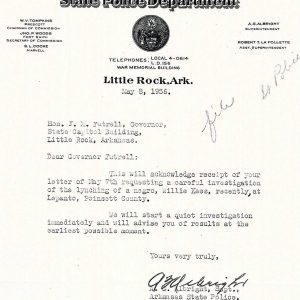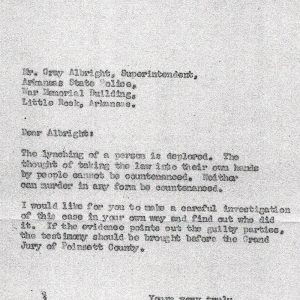calsfoundation@cals.org
Willie Kees (Lynching of)
On April 29, 1936, a nineteen-year-old African-American man named Willie Kees was shot near Lepanto (Poinsett County) for allegedly attempting to attack a white woman. It was both the first recorded lynching in Poinsett County and the last recorded lynching in Arkansas.
On April 18, Kees allegedly attacked the woman on a bridge just outside of town. She screamed, and two men came to her rescue. Kees was turned over to city marshal Jay May and put in jail. That night, May intercepted a mob that was coming to the jail to get Kees and dissuaded the citizens from doing so. He told reporters for the Arkansas Gazette that, because of the darkness, he was unable to identify anyone in the mob. Kees had not yet been charged, and the following morning, May offered to release him if he would leave the county and not come back. Several newspapers reported that Kees was whipped before his release, but both May and Deputy Sheriff Mert Walker denied this.
Within days, May discovered that Kees had not left the county but was staying in a house just outside of town. Local residents had learned of his location, and another mob was assembling to capture him. On April 29, May arrested Kees yet again, but while he was bringing him back to the jail, a group of about ten armed men, wearing burlap sacks over their heads, approached in two cars. Seven of these men restrained May, while the other three forced Kees into a car. The cars drove off through town, and Kees’s body was found on the edge of town two hours later. His hands had been tied behind his back, and he had been shot three times. According to Marshal May, Kees was “half-witted” and had been arrested for theft on several earlier occasions. Once again, no one was able to identify the men in the group, and the verdict was death at the hands of persons unknown.
Some of the women of Arkansas were outraged by the event, the first lynching in Arkansas in three years. The Arkansas council of the Association of Southern Women for the Prevention of Lynching asked both Governor Junius Marion Futrell and Sheriff J. D. DuBard of Poinsett County to re-open the investigation, calling the crime a “blot upon the fair name of our beloved state of Arkansas.” (The association, founded in Atlanta, Georgia, in 1930, was an organization of white women determined to prevent white men from using the virtue of white females as their excuse for violence against African Americans, and to encourage white southern women to themselves refuse to buy into that rationale. Their aim was to draw attention to specific incidents, and one of their methods was to negotiate anti-lynching agreements with local sheriffs.)
The death of Willie Kees drew national attention because, by happenstance, it occurred during the same week that John Rushin and Lint Shaw were lynched in Georgia. It was believed to be the first instance in “modern” times that three lynchings had occurred in one week. The lynchings of Kees and Shaw also drew the attention of the National Association for the Advancement of Colored People (NAACP). In a letter written to President Franklin Delano Roosevelt, the organization noted that the two incidents were the seventy-first and seventy-second “authenticated” lynchings that had occurred since Roosevelt had been inaugurated on March 4, 1933. The letter asked the president to encourage Congress to bring the Costigan-Wagner anti-lynching bill, first proposed in January 1934, to the floor for a vote. No anti-lynching bill was ever passed during Roosevelt’s presidency, however, and even though President Harry S. Truman made civil rights an important part of his platform, and the House of Representatives passed several versions of an anti-lynching law, powerful southerners in the Senate prevented its passage. Lynching was to remain a prevalent form of vigilante justice in the United States through the civil rights era of the 1960s.
For additional information:
“Appeal to President Roosevelt to Act in Lynchings.” New York Age, May 2, 1936, p. 2.
“Lynch Law Takes Lives of 3 Negroes to Set New Record.” Kingston Daily Freeman (Kingston, New York), May 4, 1936, p. 2
“Women Demand Enquiry into Lepanto Lynching.” Blytheville News Courier, May 5, 1936, p. 1.
“Young Negro Lynched at Lepanto.” Arkansas Gazette, April 30, 1936, p. 1.
Nancy Snell Griffith
Clinton, South Carolina
 Early Twentieth Century, 1901 through 1940
Early Twentieth Century, 1901 through 1940 Law
Law Albright Letter
Albright Letter  Futrell Letter
Futrell Letter 



Comments
No comments on this entry yet.